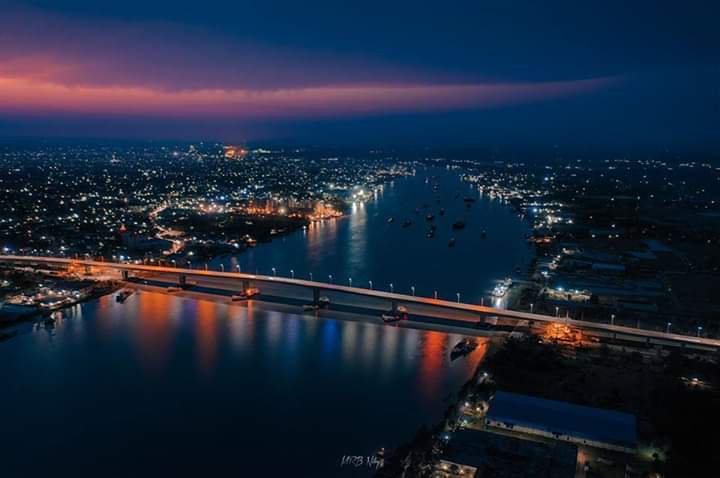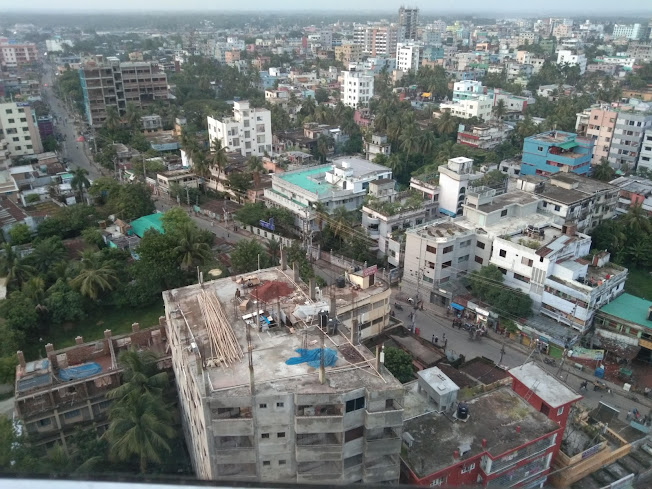Khulna
by Rasaf Ibrahim on Sep 04, 2021

Khulna is the third largest city in Bangladesh after Dhaka and Chittagong. It is the administrative territory of Khulna District and Khulna Division.The economy of Khulna is the third largest in the People's Republic of Bangladesh contributing $53 billion in nominal gross state product and $95 billion in purchasing power parity (PPP) terms as of 2020. In the 2011 census, the city had a population of 663,342. The Khulna metropolitan area had an estimated population of 1.022 million in 2014.
Khulna stands on the bank of the Rupsha and Bhairab Rivers. A centre of Bangladeshi industry, it hosts many national companies. Khulna is served by Port of Mongla (the second-largest seaport in the country), and is one of two principal naval-command centres hosting the Bangladesh Navy. The navy base BNS Titumir is in the city.
A colonial steamboat service, including the Tern, Osrich and Lepcha, continues to operate on the river route to the city. Khulna is considered the gateway to the Sundarbans, the world's largest mangrove forest and home of the Royal Bengal tiger. It is north of the Mosque City of Bagerhat, a UNESCO World Heritage Site.

Economy
Khulna is the Bangladesh's third-largest economic centre. North of the Port of Mongla, it has a variety of light and heavy industry. Major sectors are jute, chemicals, fish and seafood packaging, food processing, sugar milling, power generation and shipbuilding. The KCCI regulates commerce through its Licensed Measurers’ Department (LMD) and certification, attestation and publicity departments of this area. The region has an Export Processing Zone, which has attracted foreign investment. The city is home to branch offices of a number of national companies, including M. M. Ispahani Limited, BEXIMCO, James Finlay Bangladesh, Summit Power and the Abul Khair Group. The largest companies based in the city include Khulna Shipyard, Bangladesh Cable Shilpa Limited, Bangladesh Oxygen, Platinum Jubilee Mills, Star Jute Mills and the Khulna Oxygen Company. The economy of Khulna is the third largest in the Peoples Republic of Bangladesh, contributing $52 billion in nominal gross state product and $94 billion in purchasing power parity terms as of 2020.
Transportation
The N7 highway connects Khulna with the rest of Bangladesh, and the Khulna City Bypass is a major road. The R760 connects Satkhira and western Khulna Districts. There are several nationwide bus services available in Khulna (most privately owned), and the Bangladesh Road Transport Corporation operates inter-district bus service from the city. Sonadanga Bus Terminal is Khulna's main bus terminal. Major bus routes include Khulna-Jessore-Dhaka; Khulna-Goplaganj-Dhaka; Khulna-Jessore-Kushtia; Khulna-Satkhira; Khulna-Bagerhat; Khulna-Mongla; Khulna-Narail; Khulna-Barisal; Khulna-Rajshahi; Khulna-Faridpur; Khulna-Kuakata, and Khulna-Dhaka-Chittagong.
Khulna railway station is the city's main station in the city. Bangladesh Railway operates six intercity trains: the Sundarban and Chitra Express (to Dhaka), the Kapotaksha and Sagardari Express (to Rajshahi), and the Rupsa and Seemanta Express to Syedpur. Two commuter express trains serve Benapole, in addition to mail trains to Parbatipur, Chapainawabganj and Goalanda. The international Bandhan Express runs to Kolkata. There are four other railway stations in Khulna, and two more (in addition to the Rupsha Rail Bridge) are under construction as part of the Khulna–Mongla Port Railway project.
There is a airport in Khulna which is almost 20kilometres near from the main city.It is named Khan Jahan Ali Airport which is under construction. Jessore Airport, which is situated 50 kilometres north from the city centre.Biman Bangladesh Airlines, US-Bangla Airlines,Novoair and other airlines have regular flights between Jessore and Dhaka, with air-conditioned bus service from the airport to Khulna.Most of the annual passengers of Jashore Airport are from Khulna city.